|
|
|
Sort Order |
|
|
|
Items / Page
|
|
|
|
|
|
|
| Srl | Item |
| 1 |
ID:
145712
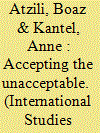

|
|
|
|
|
| Summary/Abstract |
During the past two decades, scholars have critically examined the political role of space and territory and advanced our understanding of borders with dynamic concepts based on identities and narratives. The literature, though, is divided between works that emphasize domestic politics and those that concentrate on international norms. We seek to bridge this gap by developing a general theoretical framework to understand domestic recognition, or lack thereof, of new borders that result from war losses. We use the case of West Germany post–World War II—which went from non-recognition of its new eastern border along the Oder–Neisse line to full recognition—to develop a theoretical model explaining changing border policies. We conceptualize the interaction between foreign policy priorities, domestic constituency considerations, and international norms and find that when domestic border narratives and primary foreign policy goals of the political coalition in power both point to the same policy direction (acceptance or non-acceptance of the border) then such a policy is likely to be adopted by the leadership. If, on the other hand, foreign policy goals and dominant domestic border narratives differ, we are likely to see a continuation of the border policy. In those periods of silence, however, change still takes place through a stronger influence and gradual internalization of international norms. Over time, then, we may observe a change in the dominant narrative, which could be followed by a policy change.
|
|
|
|
|
|
|
|
|
|
|
|
|
|
|
|
| 2 |
ID:
138170
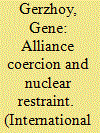

|
|
|
|
|
| Summary/Abstract |
A prominent model of nuclear proliferation posits that a powerful patron state can prevent a weaker ally from proliferating by providing it with security guarantees. The history of West Germany's pursuit of the bomb from 1954 to 1969 suggests that a patron may also need to threaten the client state with military abandonment to convince it not to acquire nuclear weapons.
|
|
|
|
|
|
|
|
|
|
|
|
|
|
|
|
| 3 |
ID:
128232
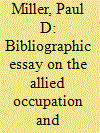

|
|
|
|
|
| Publication |
2013.
|
| Summary/Abstract |
There is no definitive, single-volume history of the Allied occupation and reconstruction of West Germany from 1945 to 1955. This is a significant and surprising lacuna in the literature on US and European history, international relations, and the rapidly growing field in reconstruction and stabilization operations. Scholars, historians, and policymakers need a comprehensive treatment of the German occupation. There is now an opportunity to fill that need. This bibliographic essay reviews the wealth of source material that has become available in recent decades. We can now synthesize primary sources and specialized scholarship to tell the story, for the first time, of how the Allies occupied and rebuilt the western part of Germany.
|
|
|
|
|
|
|
|
|
|
|
|
|
|
|
|
| 4 |
ID:
184870
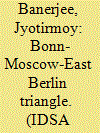

|
|
|
| 5 |
ID:
048360
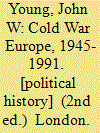

|
|
|
|
|
| Edition |
2nd ed.
|
| Publication |
London, Arnold, 1996.
|
| Description |
x, 292p.Pbk
|
| Standard Number |
0340625163
|
|
|
|
|
|
|
|
|
|
|
|
Copies: C:1/I:0,R:0,Q:0
Circulation
| Accession# | Call# | Current Location | Status | Policy | Location |
| 041479 | 940.55/YOU 041479 | Main | On Shelf | General | |
|
|
|
|
| 6 |
ID:
108912
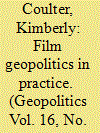

|
|
|
|
|
| Publication |
2011.
|
| Summary/Abstract |
This essay demonstrates how critical geopolitics of film can benefit from attention to behind-the-scenes practices in films' lives by examining "territorial appeals": invocations of territorial interest or identity to justify a project or win support for a position. By tracing marketing strategies in the emergence of The Miracle of Bern, a 2003 film that celebrates West Germany's World Cup football victory over Hungary in 1954, the essay shows opportunities and limitations of territorial appeals to win production funds, find distributors, and shape discourse at home and abroad. This study of negotiations among a variety of actors and institutions reveals how marketing - in all its forms - is on the "front lines" of national identity construction and perception.
|
|
|
|
|
|
|
|
|
|
|
|
|
|
|
|
| 7 |
ID:
120046
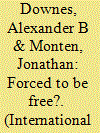

|
|
|
|
|
| Publication |
2013.
|
| Summary/Abstract |
Is military intervention effective in spreading democracy? Existing studies disagree. Optimists point to successful cases, such as the transformation of West Germany and Japan into consolidated democracies after World War II. Pessimists view these successes as outliers from a broader pattern of failure typified by cases such as Iraq and Afghanistan. Those in between agree that, in general, democratic military intervention has little liberalizing effect in target states, but contend that democracies can induce democratization when they explicitly pursue this objective and invest substantial effort and resources. Existing studies, however, often employ overly broad definitions of intervention, fail to grapple with possible selection effects in countries where democracies choose to intervene, and stress interveners' actions while neglecting conditions in targets. Astatistical examination of seventy instances of foreign-imposed regime change (FIRC) in the twentieth century shows that implementing prodemocratic institutional reforms, such as sponsoring elections, is not enough to induce democratization; interveners will meet with little success unless conditions in the target state-in the form of high levels of economic development and societal homogeneity, and previous experience with representative governance-are favorable to democracy. Given that prospective regime change operations are likely to target regimes in poor, diverse countries, policymakers should scale back their expectations that democracy will flourish after FIRC.
|
|
|
|
|
|
|
|
|
|
|
|
|
|
|
|
| 8 |
ID:
147587
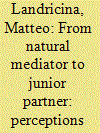

|
|
|
|
|
| Summary/Abstract |
This analysis finds basis largely on the protocols of the three West German diplomatic conferences held in Africa in 1959, 1962, and 1968. It scrutinises the idea, advanced by part of Bonn’s foreign policy élite at the end of the 1950s, that the Federal Republic of Germany had a “special mediatory role” to play between the West and Africa in the age of decolonisation. The Federal Republic played a significant indirect role, especially on the economic side, in keeping Africa tied to the West after the end of colonialism. However, because of its exposed political situation in Europe, it was never in a position to pursue a real mediating effort in Africa’s decolonisation conflicts, therefore limiting its ambitions to that of “junior partner” of the former colonial Powers in the second half of the 1960s.
|
|
|
|
|
|
|
|
|
|
|
|
|
|
|
|
| 9 |
ID:
108576
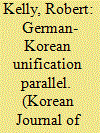

|
|
|
|
|
| Publication |
2011.
|
| Summary/Abstract |
This paper plots the greater difficulties of future Korean unification through a
comparison with Germany 1989/90. The balance of forces favors a more politicized,
more expensive, and more internationally contested Korean unification course
than in Germany. Domestically: there are more North Koreans than there were
East Germans, and they are much poorer. There are fewer South Koreans than
there were West Germans, and they are less wealthy also. South Korea's state
strength or capacity is lower than West Germany's was, while North Korea is a
semi-failed state, even by East German standards. So, fewer people with a lower
GDP per capita in a weaker system will support more people with less wealth from
a worse system. Internationally: today's external patron (the United States) of the
free Korean half is weakening, while the external patron (China) of the communist
half is strengthening. The opposite was true of the United States and West Germany,
and the Soviet Union and East Germany, in 1989. Today's northern patron (China)
is trying to push further into the Asian continent, while yesterday's eastern patron
(the Soviet Union) was looking for an exit from central Europe. Chinese peninsular
intervention is therefore easier, while U.S. support for South Korea's unification
terms will be more difficult.
|
|
|
|
|
|
|
|
|
|
|
|
|
|
|
|
| 10 |
ID:
185069
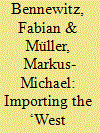

|
|
|
|
|
| Summary/Abstract |
In analyzing West German police assistance for Costa Rica, we uncover the transnational dynamics of Cold War counterinsurgency policing during the Central American conflicts of the 1980s. We scrutinize West Germany’s engagements with Costa Rica, demonstrating how technical police assistance by the self-fashioned West German ‘civilian power’ fed into a wider counterinsurgency turn in Costa Rican policing. Highlighting the role of local agency and transnational context conditions, we point towards the interest of the Costa Rican government in reaching out to West Germany to demonstrate its neutrality within the ongoing conflicts while simultaneously bolstering the counterinsurgency capacities of its police forces.
|
|
|
|
|
|
|
|
|
|
|
|
|
|
|
|
| 11 |
ID:
090672
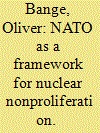

|
|
|
|
|
| Publication |
2009.
|
| Summary/Abstract |
The analysis focuses on how the nuclear powers of the west were able to prevent the spread of nuclear weapon possession among their allies within the wider framing of the east-west conflict and by multilateralizing the issue or the eventual solution through NATO. Although the article looks into history, away from the grey of today's nonproliferation problems into the clear-cut past of the east-west conflict with its disputed definition of friends and foes, some of its findings also point to current problems bedevilling NATO policies in this field.
|
|
|
|
|
|
|
|
|
|
|
|
|
|
|
|
| 12 |
ID:
162683
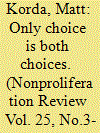

|
|
|
|
|
| Summary/Abstract |
Conventional theories of alliance management often overemphasize the utility of either assurance or coercion in preventing allied nuclear proliferation. Historical analysis reveals that prioritizing either of these two tactics to the exclusion of the other is inadvisable. A strategy that focuses solely on security guarantees or coercive threats is likely to encourage an allied state to pursue a hedging strategy, in which the client state continues to clandestinely develop its own nuclear capabilities while remaining underneath its patron’s defensive “umbrella.” This article introduces a new framework for understanding the effectiveness of nonproliferation-focused alliance-management strategies. By exploring the cases of West Germany and South Korea, the article concludes that the best way to prevent allies from pursuing nuclear weapons is to combine assurance with coercion. This establishes an incentive–punishment relationship that limits an ally’s motivation to develop nuclear weapons. These conclusions have particular salience today, as conversations over nuclear-weapons development have become increasingly normalized in Germany and particularly in South Korea. The United States’s capacity to influence its allies’ nuclear behavior is currently being eroded through the degradation of both patron credibility and client dependence, weakening the long-term viability of the global nonproliferation regime.
|
|
|
|
|
|
|
|
|
|
|
|
|
|
|
|
| 13 |
ID:
189982
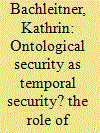

|
|
|
|
|
| Summary/Abstract |
This article explores the link between collective memory and state behaviour in international relations. In that regard, it develops a new concept entitled ‘temporal security’. Building on the existing ontological security literature, it extends a temporal understanding to its underlying identity concept. Countries are now assumed to be temporal-security seekers vis-a-vis a ‘significant historical other’ from their past. Decision makers thus enter into a self-reflective conversation with their country’s ‘collective memory’ when choosing courses of action. Contrasted with existing physical-security and ontological security explanations for state behaviour, the explanatory potential of the temporal-security approach is in a second step illustrated by the empirical case of West Germany and Austria, two former Nazi perpetrator states, and their respective assignments of support during conflict in the Middle East. Through a comparative, qualitative discourse analysis of historical documents during the Six-Day War of 1967 and the Yom Kippur War and oil crisis of 1973, the empirical study finds that West Germany and Austria adopted different courses of action in their international politics, because they looked to Nazi Germany as their significant historical other.
|
|
|
|
|
|
|
|
|
|
|
|
|
|
|
|
| 14 |
ID:
191602
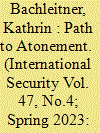

|
|
|
|
|
| Summary/Abstract |
Atonement is a state practice that comprises an official political apology and the offer of reparation payments to former victims of mass atrocities, war crimes, and human rights abuses. Despite being considered the moral and right thing to do, atonement has occurred only once at the state level: between West Germany and Israel in 1952. Whereas existing explanations view the West German pathway after the Holocaust as either an ethical choice or a domestic policy induced by U.S. pressure, atonement can also be a political decision. Politicians may give official apologies and pay reparations because such practices promise tangible political benefits. An investigation of the West German–Israeli case and a comparison with two non-atoning perpetrators of World War II, Austria and Japan, illustrate the plausibility of these claims. Atonement emerged as a bilateral strategy between West Germany and Israel because it represented a politically expedient option for both countries. This finding offers insights into when politicians may pursue atonement in other cases and points to a potential avenue toward long-term international stability and durable peace.
|
|
|
|
|
|
|
|
|
|
|
|
|
|
|
|
| 15 |
ID:
183897
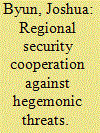

|
|
|
|
|
| Summary/Abstract |
Why do some regional powers collectively threatened by a potential hegemon eagerly cooperate to ensure their security, while others appear reluctant to do so? I argue that robust security cooperation at the regional level is less likely when an unbalanced distribution of power exists between the prospective security partners. In such situations, regional security cooperation tends to be stunted by foot-dragging and obstructionism on the part of materially inferior states wary of facilitating the strategic expansion of neighbours with larger endowments of power resources, anticipating that much of the coalition's gains in military capabilities are likely to be achieved through an expansion of the materially superior neighbour's force levels and strategic flexibility. Evidence drawn from primary material and the latest historiography of France's postwar foreign policy towards West Germany provides considerable support for this argument. My findings offer important correctives to standard accounts of the origins of Western European security cooperation and suggest the need to rethink the difficulties the United States has encountered in promoting cooperation among local allies in key global regions.
|
|
|
|
|
|
|
|
|
|
|
|
|
|
|
|
| 16 |
ID:
121893
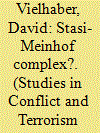

|
|
|
|
|
| Publication |
2013.
|
| Summary/Abstract |
The extent of the East German Ministry for State Security's involvement with militant left-wing terrorist organizations that operated in West Germany remains one of the most contentious issues with respect to the legacy of left-wing terrorism in Germany. Fueled by new archival evidence and much speculation, the topic has been the subject of many unfounded and sensationalist assertions. This article seeks to provide a chronological reassessment based on the current state of knowledge, and thus seeks to make a contribution to a growing literature on state involvement with terrorist groups. While the East German spy agency at times colluded with terrorist groups, the degree of support fluctuated considerably and there is no evidence that a state actor "created" the armed groups or "directed" their activities.
|
|
|
|
|
|
|
|
|
|
|
|
|
|
|
|
| 17 |
ID:
162682
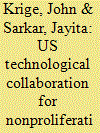

|
|
|
|
|
| Summary/Abstract |
Although the existing international-relations scholarship argues that technological assistance in the nuclear domain increases the probability of nuclear proliferation, the historical account indicates otherwise. Congressional legislation for nonproliferation, economic sanctions, and poor state capacity—specifically, inept managerial capabilities of the recipient state—explain merely part of the puzzle, but overlook the role of positive inducements offered to impede nuclear proliferation. Historical evidence shows that the United States often provided technological assistance with the deliberate intent to inhibit proliferation. In other words, Washington employed its technological leverage to attain nonproliferation goals. American technological preponderance since the end of World War II made such an approach feasible. This study examines key Cold War cases—Israel/Egypt, India, and West Germany—where the United States offered technological assistance with the deliberate intent to stall nuclear proliferation, thereby underscoring the role of assistance for inhibitive ends.
|
|
|
|
|
|
|
|
|
|
|
|
|
|
|
|
| 18 |
ID:
110101
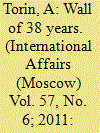

|
|
|
|
|
| Publication |
2011.
|
| Summary/Abstract |
NO OTHER EVENT has had more impact on modern European history than the Berlin Crisis of 1958-1961. Its culmination was the construction on August 13, 1961, of the famous Berlin Wall that divided East and West Germany and consolidated once and for all the existence of two German states - the Federal Republic of Germany and the German Democratic Republic.
The border between East and West Berlin had remained open until August 13, 1961. The dividing line measuring 44.75 kilometers (the total length of the border between West Berlin and East Germany was 164 km) passed directly through streets, houses, canals, and watercourses. Officially, there were 81 street crossing points and 13 passageways in the subway and on the city railroad. In addition, there were hundreds of illegal routes. Every day, between 300,000 and 500,000 people crossed the border between the two parts of the city for different reasons.1 The lack of a clear-cut physical boundary between sectors led to frequent conflicts and the mass departure of specialists to West Germany. East Germans preferred to get an education in the GDR, where it was free of charge, yet work in West Germany.
|
|
|
|
|
|
|
|
|
|
|
|
|
|
|
|
| 19 |
ID:
167230
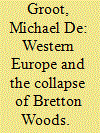

|
|
|
|
|
| Summary/Abstract |
This article contends that Western Europe played a crucial and overlooked role in the collapse of Bretton Woods. Most scholars highlight the role of the United States, focusing on the impact of US balance of payments deficits, Washington’s inability to manage inflation, the weakness of the US dollar, and American domestic politics. Drawing on archival research in Britain, Germany, the Netherlands, and the United States, this article argues that Western European decisions to float their currencies at various points from 1969 to 1973 undermined the fixed exchange rate system. The British, Dutch, and West Germans opted to float their currencies as a means of protecting against imported inflation or protecting their reserve assets, but each float reinforced speculators’ expectations that governments would break from their fixed parities. The acceleration of financial globalization and the expansion of the Euromarkets in the 1960s made Bretton Woods increasingly difficult to defend.
|
|
|
|
|
|
|
|
|
|
|
|
|
|
|
|
| 20 |
ID:
121909
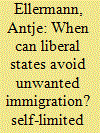

|
|
|
|
|
| Publication |
2013.
|
| Summary/Abstract |
Advanced democracies, it is commonly argued, are unable to prevent unwanted immigration because their sovereignty is "self-limited" by virtue of their normative, legal, and economic liberalism. This article challenges this claim by examining a critical test case that is at the heart of self-limited sovereignty arguments: guest worker recruitment in postwar Switzerland and West Germany. The author shows that, contrary to conventional wisdom, the unintended settlement of guest workers was not a universal given but instead was far less extensive in Switzerland than in West Germany. This difference in exposure to unwanted immigration, she argues, was the result of path-dependent processes that can be traced back to the inception of each country's recruitment program. Whereas West German officials made no concerted effort to control settlement until the program's termination, Swiss policy from its beginning was marked by state-enforced worker rotation and the prevention of family unification. To account for these critical differences in policy design, the article argues that each guest worker system was fundamentally shaped by two sets of factors. First, program design varied depending on whether or not political elites could draw policy lessons from past experience with temporary worker programs. Where past recruitment had resulted in unwanted settlement, as had been the case in Switzerland, political elites sought to adopt policy provisions designed to prevent the past from repeating itself. Where past policy failure was absent, as was the case in West Germany, policymakers were less concerned with preempting settlement. Second, recruitment policy reflected the degree to which policymakers were able to operate autonomously from cross-cutting interests. Whereas the West German government could pursue recruitment relatively insulated from both business and popular pressure, Swiss policymakers had to repeatedly accommodate both sets of actors, in the process devising a recruitment system firmly premised on the principle of worker rotation.
|
|
|
|
|
|
|
|
|
|
|
|
|
|
|
|
|
|
|
|
|